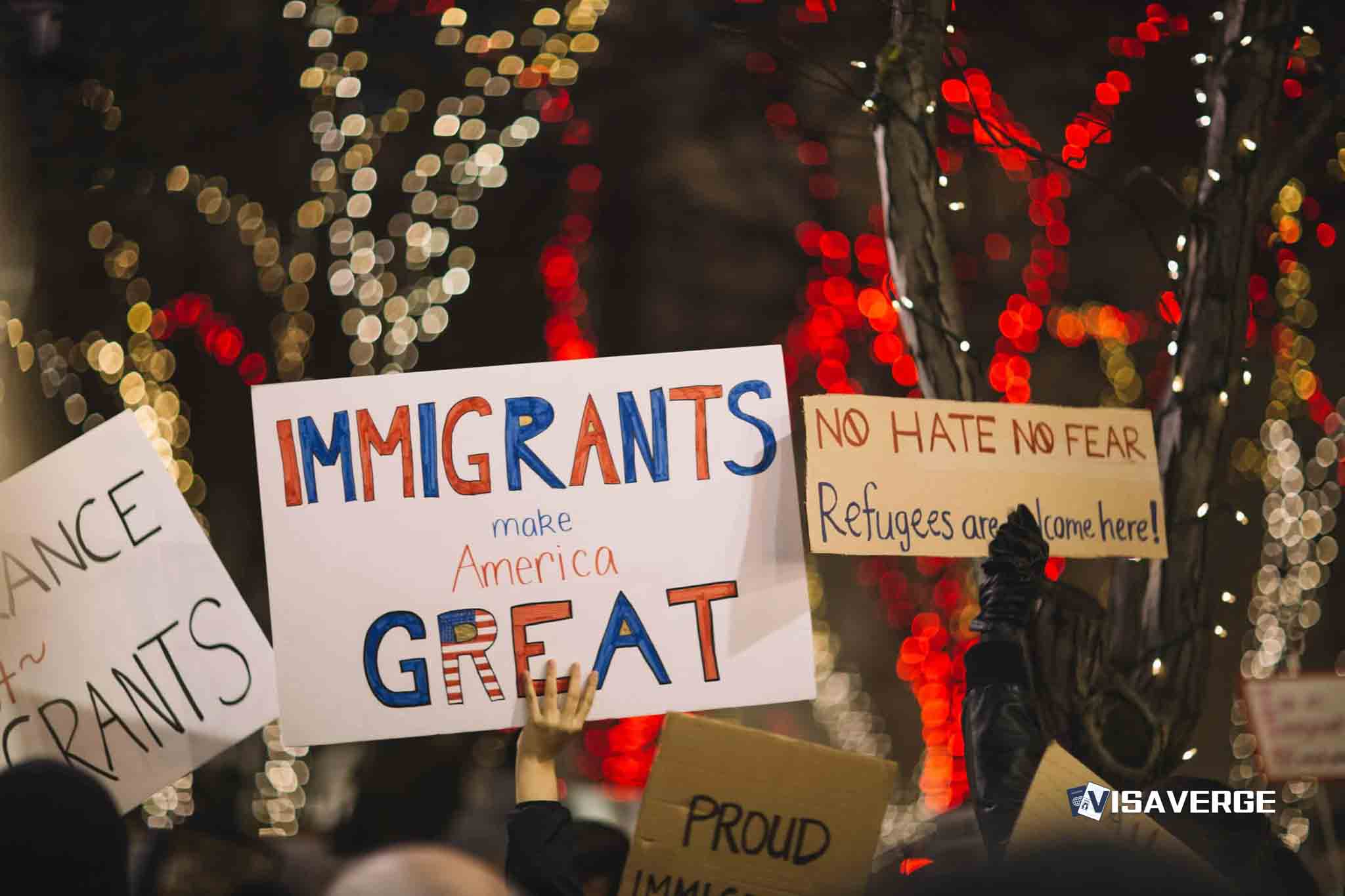Key Takeaways
• On February 20, 2025, President Trump signed an executive order to eliminate taxpayer-funded benefits for undocumented immigrants.
• Federal agencies must identify programs aiding undocumented immigrants and tighten eligibility checks to reserve benefits for lawful residents.
• Existing laws largely bar undocumented immigrants from federal benefits, but the order aims to address alleged enforcement gaps and financial strain.
President Donald Trump signed an executive order on February 20, 2025, targeting the elimination of federal taxpayer-funded benefits for undocumented immigrants. This directive mandates federal agencies to identify programs that provide either cash or non-cash benefits to undocumented immigrants and align them with the order’s goals. A core part of this initiative also focuses on making eligibility checks more robust to ensure benefits are reserved for those lawfully residing in the United States.
President Trump emphasized the rationale behind this measure, stating that his administration is working to “uphold the rule of law, defend against the waste of hard-earned taxpayer resources, and protect benefits for American citizens in need, including individuals with disabilities and veterans.” While the executive order underscores these commitments, it is essential to examine the broader implications and the legal backdrop that frames this decision.

Existing Legal Landscape on Benefits for Undocumented Immigrants
A critical fact often overlooked in discussions around public benefits is that undocumented immigrants are already excluded from most federal assistance programs. This exclusion stems from the Personal Responsibility and Work Opportunity Reconciliation Act of 1996 (PRWORA), which explicitly bars undocumented immigrants from accessing federally funded programs. This means that, under existing laws, undocumented immigrants cannot access programs like Medicaid, food stamps, or federal housing assistance. President Trump’s order acknowledges these legal limitations but argues that previous administrations have not consistently enforced them.
This executive order appears to build on the claim that past administrations, including policies under President Biden, may have weakened the enforcement of these restrictions. According to a White House statement, the costs associated with undocumented immigrants have placed significant strain on federal, state, and local budgets. Citing a House Homeland Security Committee report, the administration has alleged that taxpayers might incur up to $451 billion in costs for undocumented immigrants who have entered the U.S. since January 2021.
These financial claims are echoed by research from the Federation for American Immigration Reform (FAIR), which estimates that American taxpayers spend approximately $182 billion annually to support 20 million undocumented immigrants and their children. This figure combines federal, state, and local expenditures, with $66.5 billion accounting for federal costs and $115.6 billion attributed to state and local budgets. Such figures are frequently used to justify more stringent immigration-related policies, including steps like the current executive order.
Health Coverage Barriers for Immigrant Populations
Despite arguments suggesting that undocumented immigrants excessively burden public resources, an analysis of health care data paints a more nuanced picture. A Kaiser Family Foundation report highlights significant disparities in health coverage among immigrants in the U.S. As of 2023, half of likely undocumented adults and one in five lawfully residing immigrant adults lacked health insurance, compared to only 6% of naturalized citizens and 8% of U.S.-born citizens.
This lack of insurance stems from multiple barriers unique to immigrant populations:
- Employment-Based Disparities: Many immigrants, particularly undocumented individuals, work in jobs that do not offer health insurance benefits.
-
Eligibility Restrictions: Federal programs like Medicaid, Medicare, the Children’s Health Insurance Program (CHIP), and Affordable Care Act (ACA) Marketplace plans impose strict eligibility requirements that exclude undocumented immigrants. These restrictions extend even to state-level programs in many cases.
-
Enrollment Challenges: Even those eligible for coverage often face obstacles, such as confusion over eligibility criteria, language accessibility issues, and fear of utilizing publicly funded programs due to potential immigration consequences.
The combination of these factors not only limits health care access but also discourages individuals from seeking preventive or urgent medical care. Immigrants, including undocumented individuals, report higher rates of skipping or delaying necessary medical treatment due to these barriers. Nonetheless, immigrants generally use fewer health care services per capita than U.S.-born citizens. For example, in 2021, the average annual health care expenditure for immigrants in the United States stood at $4,875 versus $7,277 for U.S.-born citizens.
Remarkably, research also indicates that undocumented immigrants contribute significantly to the country’s health care system. Through insurance premiums and other contributions, they help subsidize the care required by U.S.-born citizens, effectively offsetting some of the costs associated with their limited use of health care services.
Broader Implications of Trump’s Executive Order
The executive order is part of a broader immigration strategy under President Trump’s administration, which has included measures like increased law enforcement raids and policies aimed at reducing sanctuary city protections. According to the order, federal funds allocated to states and municipalities will no longer be permitted to support sanctuary initiatives or aid services for undocumented immigrants.
However, one critical impact of such measures is the rise of fear among immigrant communities—documented and undocumented alike. Even before this executive order, nearly 75% of immigrant adults, including nine in ten undocumented adults, expressed uncertainty about how accessing public benefits might affect their chances of obtaining legal immigration status or future green cards. Many feared the use of non-cash assistance programs could jeopardize their immigration status, even though these claims are often based on misinterpretations of policy. Orders like the one recently signed by President Trump risk increasing this fear, potentially encouraging eligible immigrants to forgo necessary services.
Additionally, concerns have been raised that Trump’s administration may reintroduce public charge policies, which penalize immigrants perceived as financially dependent on public resources. Understanding how these policies will align with the new executive order remains a critical aspect of the ongoing immigration debate.
Challenges and Criticism
While proponents of the executive order often cite financial arguments, critics point to several flaws in the rationale. For one, the emphasis on undocumented immigrants as a financial burden ignores their contributions to social welfare programs. Through payroll taxes, sales taxes, and other avenues, undocumented immigrants contribute billions annually to public funds—often without accessing the benefits those funds support.
Moreover, as previously noted, most undocumented immigrants are ineligible for federal benefits already, raising questions about the necessity of an order aimed at restricting access to programs they largely do not qualify for under existing laws. Critics argue that the order’s real impact will be to sow fear and further marginalize immigrant communities, rather than significantly reduce public expenditures.
What This Means Going Forward
For immigrants impacted by this order, understanding its immediate effects is vital. Although the directive focuses on identifying and addressing potential loopholes, most undocumented immigrants will see little direct change to their eligibility for public benefits since PRWORA remains the governing law. However, indirect effects, such as increased fear of interacting with public systems, could lead to reduced access to essential services.
Immigrants concerned about the implications should seek professional legal advice to understand their rights and the impact of this policy on their specific circumstances. Additionally, employers, health care providers, and advocates working with immigrant populations should prepare to address the inevitable confusion and fear that will follow this executive order.
For further details on federal benefit eligibility guidelines under existing laws, refer to the official U.S. Citizenship and Immigration Services (USCIS) page on public benefits: https://www.uscis.gov.
As reported by VisaVerge.com, the policy is expected to continue drawing both domestic and international attention, particularly in light of the broader immigration debates under President Trump’s administration. While the exact long-term effects of the order remain to be seen, its immediate impact lies in its ability to reignite fears and spark renewed debates about immigration policy in the United States.
Learn Today
Executive Order → A legal directive issued by the U.S. President to federal agencies, carrying the force of law without requiring Congressional approval.
Undocumented Immigrants → Individuals residing in a country without legal authorization or valid immigration documentation recognized by the government.
Personal Responsibility and Work Opportunity Reconciliation Act (PRWORA) → A 1996 U.S. law restricting undocumented immigrants from accessing most federally funded assistance programs.
Public Charge → An immigration policy denying entry or legal status to those deemed likely to rely primarily on public assistance.
Sanctuary Cities → Jurisdictions limiting cooperation with federal immigration enforcement to protect undocumented immigrants from deportation.
This Article in a Nutshell
President Trump’s 2025 order intensifies scrutiny on public benefits for undocumented immigrants, aiming to preserve taxpayer resources for citizens. Although undocumented individuals are already excluded from most federal programs, critics argue this policy spreads fear among immigrant communities. Supporters claim fiscal responsibility, while opponents highlight immigrants’ economic contributions and possible marginalized impacts.
— By VisaVerge.com
Read more:
• Trump Ends Federal Benefits for Undocumented Immigrants with New Order
• What Rights Do Undocumented Immigrants Have in the U.S. Legal System?
• Delaware Charter Schools Network Backs Plan to Protect Undocumented Students
• Trump Administration Sends Undocumented Immigrants to Guantanamo Bay
• 32 Undocumented Immigrants Arrested in Palm Beach County Amid ICE Crackdown













